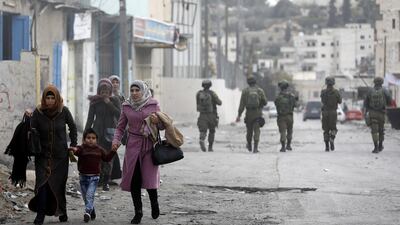President Donald Trump on Tuesday appeared to threaten to cut off US aid money to the Palestinian Authority, asking why the US should make "any of these massive future payments" when the Palestinians are "no longer willing to talk peace".
In a pair of tweets, Mr Trump said the US pays "the Palestinians HUNDRED OF MILLIONS OF DOLLARS a year and get no appreciation or respect".
"They don't even want to negotiate a long overdue ... peace treaty with Israel," he wrote.
Mr Trump infuriated the Arab world and upset Western allies when he announced late last year that the US would consider Jerusalem the capital of Israel and move its embassy there, upending decades of US policy and igniting protests.
While the Palestinians haven't closed the door to a potential deal with Israel, Palestinian leader Mahmoud Abbas said the announcement had destroyed Mr Trump's credibility as a Middle East peace broker, calling the decision "a declaration of withdrawal from the role it has played in the peace process".
Tuesday's tweets mark a tacit admission by Mr Trump that his decision to move the US embassy in Israel from Tel Aviv to Jerusalem has thrown a wrench into his administration's plans to restart the peace process between Israelis and Palestinians, which he had dubbed "the ultimate deal".
_______________
Read more:
Palestinians recall envoy to US for consultations after Jerusalem move
Year in review: What now for the Palestinians?
_______________
Mr Trump tasked son-in-law Jared Kushner to restart the effort, and brought his former attorney, Jason Greenblatt, into the White House to lead the negotiations. Mr Trump's Middle Eastern peace team had held meetings with Israeli, Palestinian and Arab leaders for nearly a year ahead of an expected peace proposal.
But by recognising Israel's claim to Jerusalem, Mr Trump was seen by the Palestinians as siding with Israel on the most sensitive issue in the conflict. The Palestinians seek east Jerusalem — which Israel captured in 1967 — for their capital.
Mr Trump said his decision merely recognised the reality that Jerusalem already serves as Israel's capital and wasn't meant to prejudge the final borders of the city.
In his tweets, Mr Trump argued his decision had taken "Jerusalem, the toughest part of the negotiation, off the table, but Israel, for that, would have had to pay more".
When Mr Trump declared Jerusalem to be Israel's capital, he insisted, counterintuitively, that the move would improve, not hurt, prospects for clinching a peace deal.
In the days after the decision, Trump administration officials said the strategy was based on the notion that Israel had lost faith in the US as a committed partner during the Obama administration. With trust in Washington restored, Mr Netanyahu's government would be more inclined going forward to make tough concessions that would ultimately be needed for a peace deal, the US officials argued at the time, and Israeli officials quietly indicated that they could potentially do so.
No one spelled out, however, what the Palestinians would receive in return.
Mr Trump on Tuesday also issued a threat to cut off foreign aid dollars to an unspecified list of countries that don't reciprocate.
"It's not only Pakistan that we pay billions of dollars to for nothing, but also many other countries, and others," Trump wrote, appearing to reference a January 1 tweet lambasting Pakistan for failing to do enough to combat terror groups while taking US aid. "No more!" Mr Trump had tweeted Monday.
His language marks a striking departure from decades of bipartisan American practice and reflects Mr Trump's transactional view of global affairs. US leaders of both parties have long utilised foreign assistance dollars — a minor percentage of the overall budget — to promote American interests abroad, alleviate humanitarian crises and support oppressed peoples.
Mr Trump's envoy to the United Nations, US Ambassador Nikki Haley, foreshadowed Mr Trump's warning earlier on Tuesday at the UN Security Council. Ms Haley said the president doesn't want to give more funds "until the Palestinians are willing to come back to the negotiation table".
"We still very much want to have a peace process. Nothing changes with that. The Palestinians now have to show they want to come to the table," Ms Haley said. "As of now, they're not coming to the table, but they ask for aid. We're not giving the aid. We're going to make sure that they come to the table."
Since a December 21 UN vote condemning Mr Trump's Jerusalem decision, US officials have been weighing various options for retaliating against the Palestinians for pushing the resolution, which passed by a 128-9 margin.
A number of those options, which were to be discussed by Mr Trump's top national security aides at a meeting next week, involved cutting off some or all aid to the Palestinian Authority. Another option would cut funding to the UN agency that provides services to the Palestinians in places like Gaza, Jordan and Lebanon.

